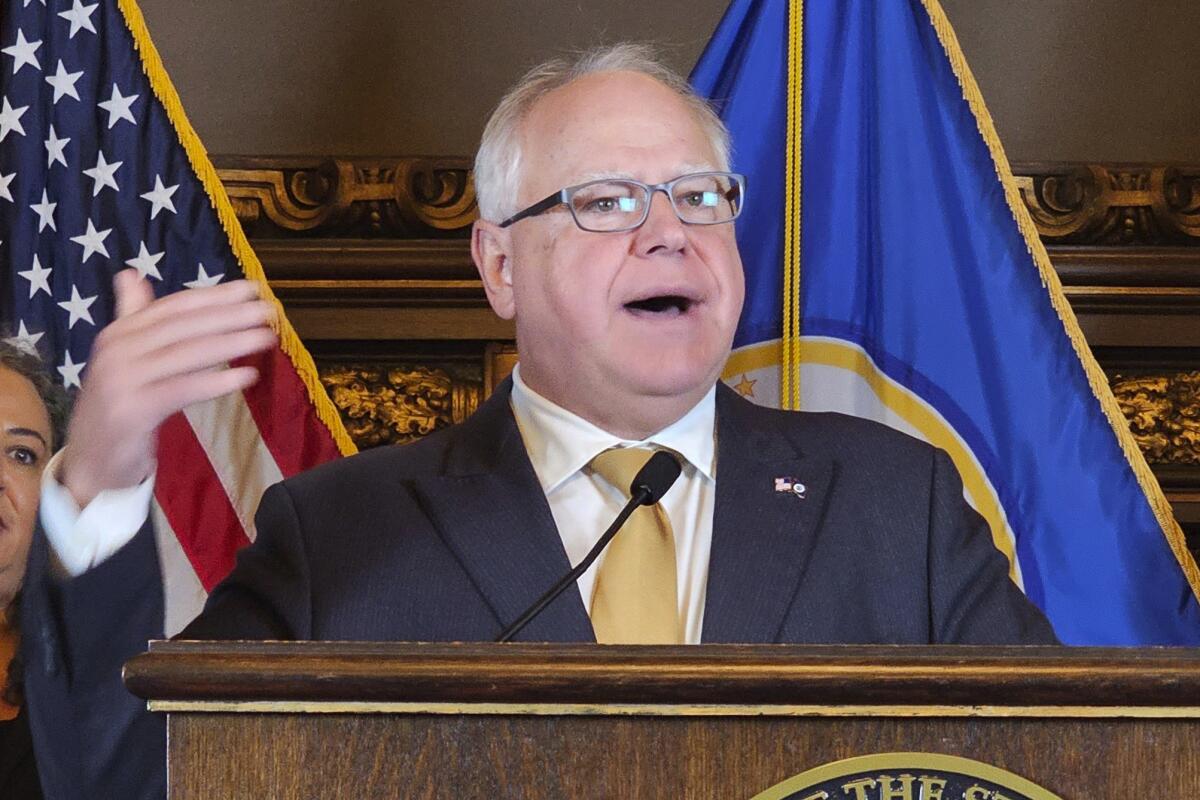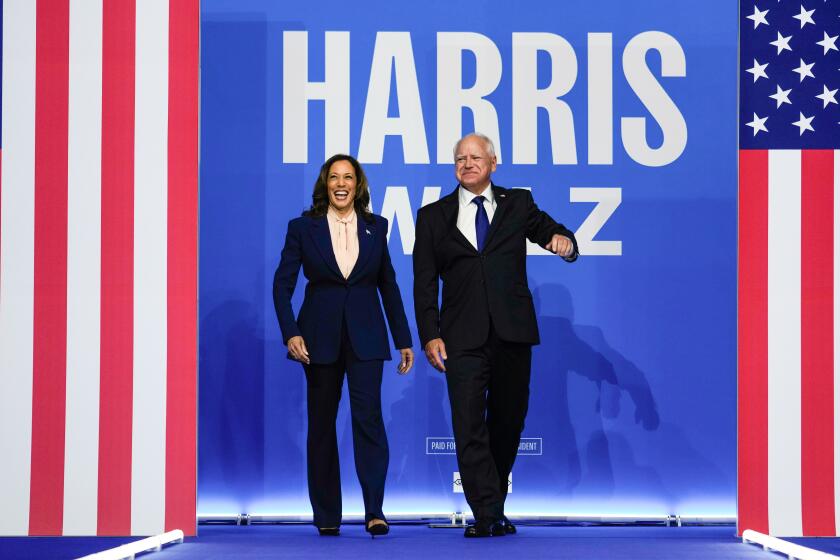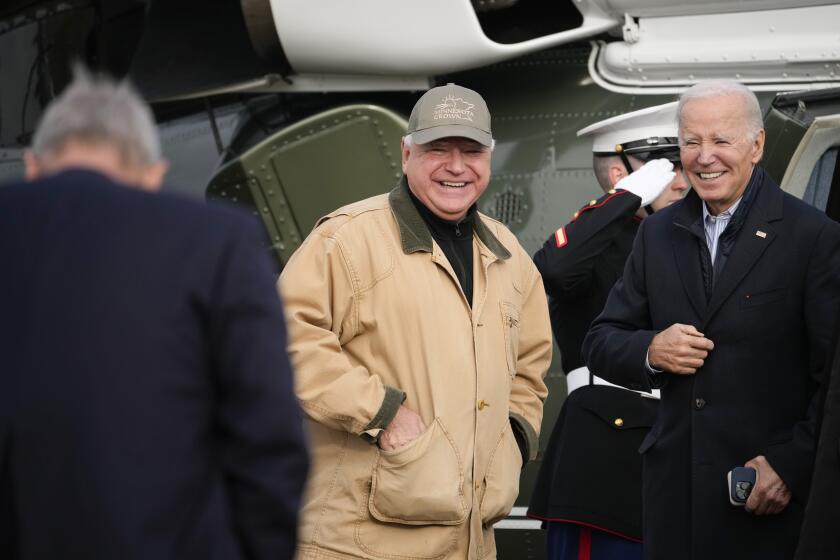Column: Tim Walz is having a moment. But he won’t win or lose the election for Harris

- Share via
Barack Obama wasn’t elected president because he chose to run alongside Joe Biden.
Mitt Romney didn’t lose his White House bid because Paul D. Ryan was his pick for vice president.
There is a tendency in the headiness of the moment to ascribe great political import to what is often described as the first consequential decision a presidential nominee makes: the selection of his or her vice presidential running mate.
Far too much import.
That’s not to say the choice is inconsequential, or that Kamala Harris’ selection Tuesday of Minnesota’s Tim Walz is utterly immaterial to the country’s closely fought presidential contest. Characteristically, she went with the safe choice: a Midwestern governor with a nonthreatening dad vibe who won’t seem out of place in appearances at the local Grange Hall or chitchatting at a coffee shop on rural Main Street.
The alternative and first runner-up in the Democratic veepstakes, Pennsylvania Gov. Josh Shapiro, had the advantage of potentially boosting Harris in a must-win state. But he also risked alienating progressive Democrats unhappy with his past support for school vouchers or current stance on the Israel-Hamas war.
And, to put it bluntly, pairing a Black woman with a Jewish running mate may have been too much at once for a nation that, not many generations ago, treated both as less-than-full-fledged citizens.
Kamala Harris has selected Minnesota Gov. Tim Walz as her running mate. The moderate Democrat demonstrated the ability to work with Republicans when he was in Congress.
That said, Harris’ choice of Walz — or, for that matter, Donald Trump’s pick of the stumbling-from-the-gate JD Vance — will not determine who sits in the White House come Jan. 20. When voters go to the polls, all but an exceeding few will be focused on the top of the ticket, not the vice presidential understudy.
“Truth is, she has to do this on her own,” said Paul Maslin, a Democratic strategist who praised Harris’ selection as a well-considered, do-no-harm pick.
Walz, who was plucked from relative political obscurity, is doubtless having a moment. He will enjoy another lesser one when, and if, he and Vance square off on a debate stage this fall.
But soon enough, should Harris prevail in November, Walz will assume the traditional role of vice president: disappearing into the long shadow of the chief executive, all but forgotten until and unless some dire or unusual set of circumstances pushes him again to the fore.
Consider the current occupant of the No. 2 job.
Despite the historic nature of her election — as the nation’s first female, Black and Asian American vice president — Harris has spent most of her vice presidency in a combination of obscurity and political purgatory. If anything, her role as a path-breaker created expectations that far exceeded the inherent subservience of her vice presidential position. Only in the last two weeks, after she replaced Biden atop the ticket and was freed to claim the spotlight, has Harris generated anything close to the excitement that attended her initial selection.
So Walz should relish his fleeting celebrity while he can.
The first-blush reviews were positive among fellow Democrats, drawing praise across the ideological spectrum, from the progressive Alexandria Ocasio-Cortez to the right-leaning-Democrat-turned-independent Joe Manchin III. (Republican attacks on Walz — as a failed governor and radical lefty — were to be expected.)
Walz manages to check the box on many of the issues — abortion, gun control, labor and LGBTQ+ rights — that Democratic activists care deeply about. At the same time, his bipartisan work during his years in Congress representing rural Minnesota before his election as governor suggest a moderation that could appeal to centrists and independents with little use for the extremes of either side.
That balance — progressive while grounded in traditional Midwestern touchstones — is reflected in his years teaching high school geography, when he served as both football coach and faculty advisor to the campus’ gay-straight alliance.
Kamala Harris chose Minnesota Gov. Tim Walz as her vice president, ensuring the rest of the election season will be ‘weird’ — and wonderful.
His selection followed a hurried-up vetting process necessitated by the short window afforded Harris once Biden stepped aside. Any proverbial skeletons that may have been missed will emerge in the days and weeks to come. For the moment, at least, Walz seems to have passed the do-no-harm test that has become the guidepost for choosing a running mate.
But that’s one of bit of Hippocratic wisdom that may be overstated.
Sure, no presidential candidate wants to create problems for him- or herself. But two of the most inopportune vice presidential picks of modern times — Dan Quayle and Sarah Palin — had no significant bearing on their running mates’ fortunes.
George H.W. Bush won despite Quayle’s stumbles. John McCain lost not because of Palin’s ineptitude.
At the end of the day, like every other presidential candidate, Harris will win or lose the White House on her own merits. Walz may help here or there, on the margins. But mostly he’s just along for the ride.
More to Read
Get the latest from Mark Z. Barabak
Focusing on politics out West, from the Golden Gate to the U.S. Capitol.
You may occasionally receive promotional content from the Los Angeles Times.













